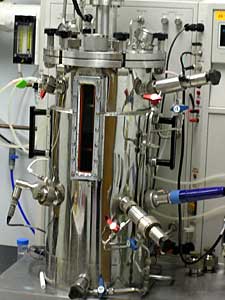|
Audio
Photos
Resources
|
 |
| Researchers say DNA-based vaccine can be produced more quickly and at a lower cost. (MPR Photo/Dan Gunderson) |
Fargo, N.D. — When Michael Chambers finished college at North Dakota State University, he wanted to start a life science research company, but he also wanted to stay in his home state.
So he cobbled together some financial help from family and friends, used what he calls creative credit card financing, and with a lot of advice from successful business owners, he started Aldevron on a borrowed laboratory bench at NDSU.
Eight years later, Michael Chambers is president and CEO of an international company on the cutting edge of genetic research.
"Aldevron made the world's first DNA vaccine used outside of a trial setting," says Chambers. "And it wasn't a human vaccine, but nonetheless it was still the world's first DNA vaccine."
|
The technology is beginning to earn it's place among the other technologies in vaccines. And we're really going to learn in the next three to four years how well it's going to perform in the field.
- Dr. Gary Nabel
|
That vaccine was produced for the U.S. Centers for Disease Control to save endangered California condors from the West Nile virus.
"There are only 200 condors left in the world and West Nile drops them like a rock. So the CDC needed a vaccine very quickly. We were able to produce one in a little over a month," says Chambers.
That's six months to a year faster than traditional vaccine production, according to Chambers.
The cornerstone of Aldevron's business is providing DNA for research.
Let's say you're trying to make a new influenza vaccine. You isolate a specific piece of DNA, called a plasmid, from the virus. Aldevron can quickly provide thousands of exact copies of the plasmid.
Victoria Chambers explains the process as she walks through the companies small production laboratory in a Fargo industrial neighborhood.
"What we do in here is we're going to put the plasmid DNA into bacteria," says Chambers. "You remember school (where)you see the cells separating, and the bacteria is going to be multiplying and they're going to clone anything that's in there. They're making copies of that DNA. So, we're kind of like a biological photocopier."
Aldevron uses a patented filtering process to separate the DNA copies.
Michael Chambers says DNA technology can test hundreds of vaccine variations at a time. That speeds the process of identifying and producing a new vaccine.
"When we work on an influenza vaccine, we're generating hundreds of thousands of potential (vaccine) candidates," Chamber says. "So, if the virus does change and mutate we don't have to do this again every year. We just go back to our shelf and look at the candidates we've screened before and chances are we're going to have a candidate in there somewhere for use against influenza."
Speed could be important in finding an effective vaccine for something like avian influenza where the virus can rapidly mutate.
But that rapid response to a virus is likely still a few years down the road, according to the federal governments lead vaccine researcher.
Dr. Gary Nabel, head of the vaccine research center at the National Institutes of Health, says DNA vaccine technology shows great promise as a research tool to speed up the process of finding new vaccines. But he says there are still questions about how effective DNA vaccines are in humans. Nabel says a number of clinical trials are currently underway.
"I do think the technology is beginning to earn it's place among the other technologies in vaccines. And we're really going to learn in the next three to four years how well it's going to perform in the field," says Nabel.
DNA vaccines are part of what Dr. Nabel calls a renaissance in vaccine technology. He says DNA vaccine is one of several recent breakthroughs that might dramatically change how humans are protected against disease.
Fargo-based Aldevron hopes to be a leading force in the development of new vaccines. The company has formed partnerships with several small and large genetic research companies.
Aldevron participated in a just-completed animal study that successfully tested a DNA vaccine for Hepatitus B. And, the company recently purchased a German research firm, and together they're looking for new treatments for cancer and alzheimers.
Aldevron President and CEO Michael Chambers says his goal is to be the world's leading company for vaccine DNA production. He's also encouraging other small bioscience companies to help make Fargo a center of bioscience research and development.





